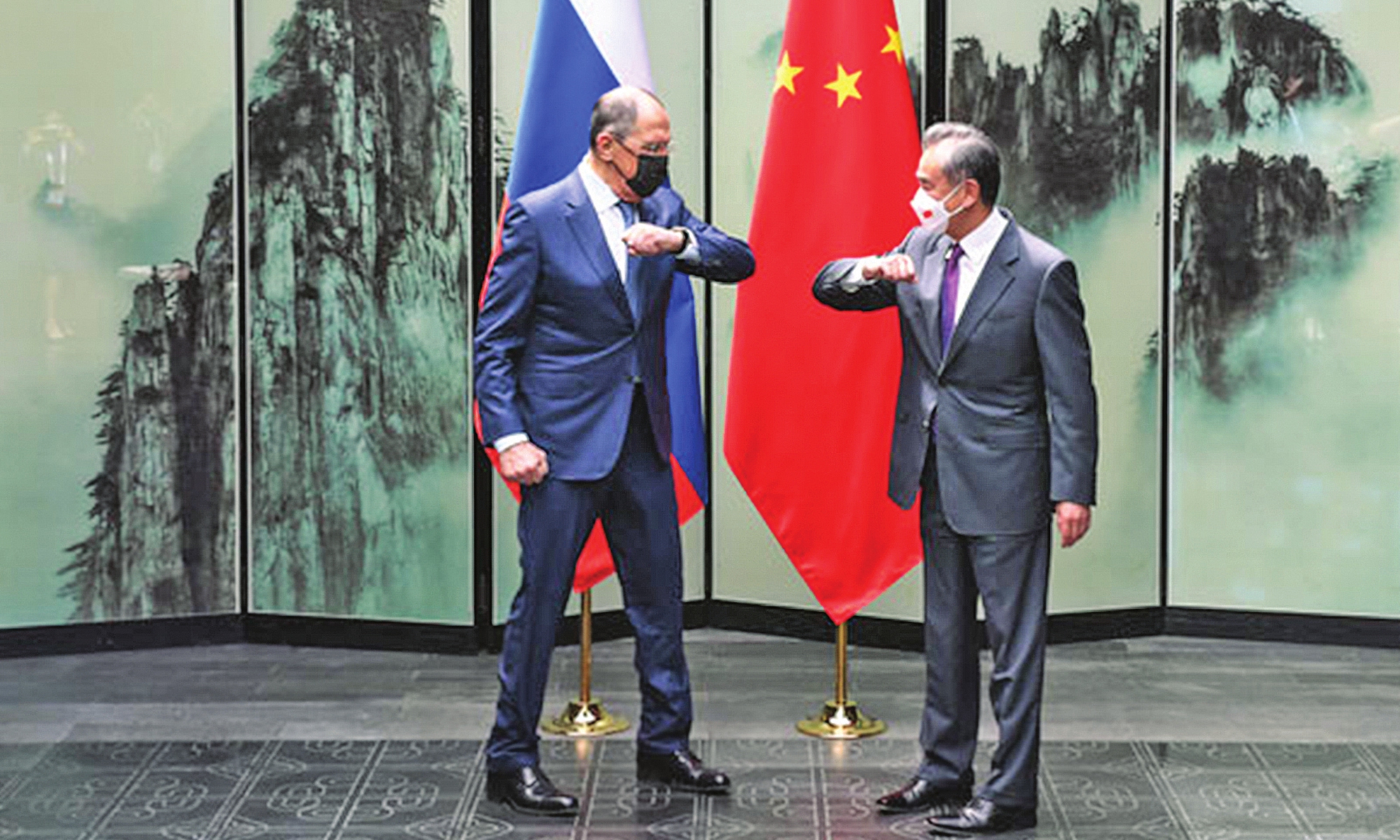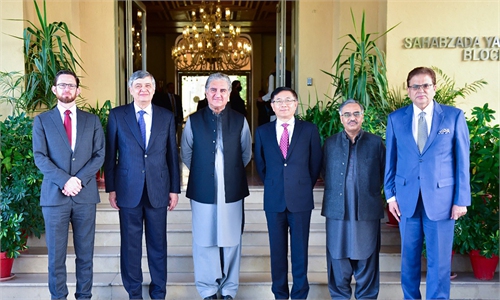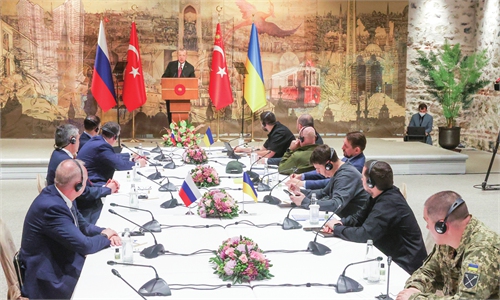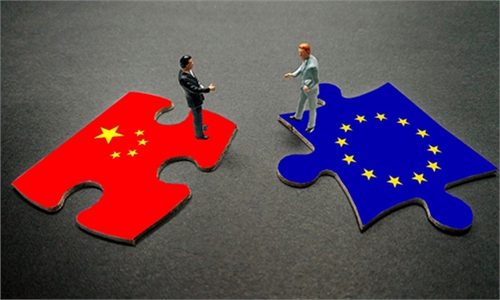Wang meets Lavrov in China, hails ties as withstanding test of changing intl situation

Chinese State Councilor and Foreign Minister Wang Yi (right) meets with Russian Foreign Minister Sergey Lavrov on Wednesday in Tunxi, East China's Anhui Province. Photo: Chinese Foreign Ministry
Chinese State Councilor and Foreign Minister Wang Yi met with Russian Foreign Minister Sergey Lavrov on Wednesday in Tunxi, East China's Anhui Province, highlighting the continuing efforts to strengthen strategic partnership, amid the Ukraine crisis and other ongoing crises such as Afghanistan which have been overshadowed as a result.
The in-person Wang-Lavrov meeting was held on the sidelines of the third meeting of the foreign ministers of Afghanistan's neighboring countries, which was chaired by Wang. The foreign ministers of Pakistan, Iran, Russia, Tajikistan, Turkmenistan and Uzbekistan or their representatives are attending the meeting from Wednesday to Thursday, according to the Chinese Foreign Ministry.
The in-person meeting is the first between Wang and Lavrov since Russia's special military operation in Ukraine started on February 24. It comes as the US and some Western countries are hyping Beijing's "dilemma" of whether to distance itself from Moscow over Ukraine or face condemnation and potential sanctions from Washington.
However, Chinese experts said that China's posture is always consistent and balanced when dealing with ties with Russia and the US. The development of Beijing-Moscow ties, is not due to a bloc-like mentality but an inner basis of mutual benefits.
Chinese Foreign Ministry spokesperson Wang Wenbin said at a Wednesday press briefing that China and Russia have always been committed to developing bilateral relations on the basis of the principles of non-alliance, non-confrontation and non-targeting of any third country.
The spokesperson hailed the stepped-up relations as one of "no limits to China-Russia cooperation, no limit to our pursuit of peace and maintaining security, and no limit to our opposition to hegemony."
China and Russia will continue to practice genuine multilateralism and promote a multi-polar world and democracy in international relations, the spokesperson said.
According to Russian media outlet TASS, the meeting between the two foreign ministers took place in a "traditionally trust-based and friendly atmosphere," and a number of issues were discussed, including the current state of affairs in Afghanistan, the Iranian nuclear program and the Korean Peninsula.
Citing a Russian statement, TASS said the pair agreed that Russia and China would continue to strengthen their strategic partnership and further bolster foreign policy coordination, enhance cooperation on the bilateral track as well as in various multilateral formats.
Wang pointed out that China-Russian relations have withstood new tests by changes in the international situation, maintained the right direction and demonstrated a solid development trend.
The desire of the two sides to develop bilateral relations has become even stronger, so has the confidence to promote cooperation in various directions, Wang said.
Lavrov said Russia is ready to work with China to continuously strengthen high-level strategic coordination and deepen mutually beneficial cooperation in all areas, and oppose hegemonism.
Analysts said that although the US and some Western countries are trying to use the Ukraine crisis to drive a wedge between China and Russia, the attitudes outlined in the latest ministers' meeting indicate that the solid relationship between China and Russia is unlikely to be weakened by the US and the West, or by external events such as the Ukraine crisis.
Constructive role
Just a day before the Wang-Lavrov meeting, Russian negotiators said on Tuesday that Russia will cut back operations near Ukraine's capital Kiev and the northern city of Chernihiv following "substantial" peace talks in Istanbul, which was described as "most meaningful progress" so far.
According to the Chinese Foreign Ministry's statement, Lavrov has informed the Chinese side on the progress of the peace talks, saying that Russia is committed to lowering the tension and will continue to hold peace talks with Ukraine and maintain communication with the international community.
Wang said China supports the efforts of Russia and Ukraine to overcome difficulties and continue peace talks, support the de-escalation of the situation as soon as possible, and support the efforts made by Russia and other parties to prevent a large-scale humanitarian crisis.
Cui Heng, an assistant research fellow from the Center for Russian Studies of East China Normal University, told the Global Times on Wednesday that China has actually played a constructive role in promoting the peace talks, which was not being widely covered in the West.
Chinese diplomats have been talking with Russia and Ukraine counterparts since the Ukraine crisis escalated, encouraging the two to sit down and talk about a peaceful solution, while opposing the West's fanning of the flames and immoderate sanctions against Moscow, Cui added.
The United Nations General Assembly voted on March 2 to condemn Russia for its military operation, with China abstaining. While sowing discord between China and Russia, some Western media smeared China's efforts for peace due to the abstention vote.
Despite speculation in the West that China faces the risk of secondary sanctions due to its ties with Russia, experts said China and Russia will not reduce their existing cooperation because of the risk of sanctions, which will not help the US achieve its strategic goals, because sanctions are bound to create divisions in the Western world and will also backfire on themselves.
China and Russia are building up their relations not because China wants to confront the West, but because cooperation and business between neighbors brings substantial benefits to both sides, which is the essence and basis of the ties, Cui said.
"China and Russia do not target any third party. The connection between China and Russia should not be misinterpreted by the West as political support, but as one based on development needs," he added.
There have been frequent meetings and communications between the Chinese and Russian foreign ministers in 2022. The two held a phone conversation on February 24 when they exchanged views on the Ukraine issue.
Wang met with Lavrov in Beijing on February 3. On January 10, the pair had a phone conversation. Analysts said it highlighted the close coordination and mutual trust between China and Russia on major issues, as well as the maturity and stability of bilateral relations.
Since the Wang-Lavrov meeting occurred on the sidelines of an Afghanistan-related ministerial conference, Li Haidong, a professor from the Institute of International Relations at China Foreign Affairs University, believes the cooperation between China and Russia on Afghanistan is bound to move forward.
Ensuring that reconstruction efforts in Afghanistan are on track and that the Ukraine crisis winds down are two key objectives of the current diplomatic coordination between Russia and China, both of which are substantive moves that cannot be covered up by Western smears, Li said.
Although an extended meeting of the China-US-Russia consultation mechanism on the Afghan issue is expected to be held as well, analysts said Lavrov's participation in the Afghan-related conference reflects that the mode of dealing with Afghan-related issues is changing and becoming dominated by regional countries with relevant interests.
Neighboring countries and Afghanistan are in a community of a shared future, said Cui, "the stability of Afghanistan is directly related to the security and stability of its neighbors, so these countries have a great sense of responsibility and are willing to invest in it."
For now, the US has largely taken a "throwaway approach" in Afghanistan, which means there is not much room for cooperation between China, the US and Russia. So in the future, the rebuilding of Afghanistan relies on cooperation between China, Russia, Iran and other regional countries, Cui said.




